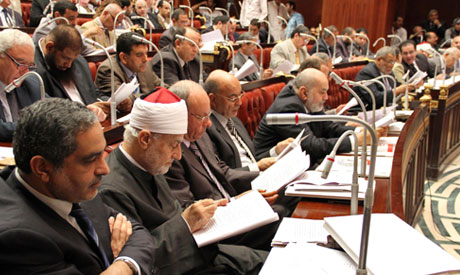 An argument between Islamists and liberals over the terms of the draft constitution erupted on Monday, jeopardising the fate of the charter. The two camps both said that unless their conditions were met, they would withdraw from the ranks of the 100-member Constituent Assembly tasked with writing the constitution.
An argument between Islamists and liberals over the terms of the draft constitution erupted on Monday, jeopardising the fate of the charter. The two camps both said that unless their conditions were met, they would withdraw from the ranks of the 100-member Constituent Assembly tasked with writing the constitution.
The ultraconservative Salafists of the Nour Party demanded that Article 2 on sharia (Islamic law) be amended to state that “the rules of Islamic sharia are the main source of legislation in Egypt.”
Nour Party member Noureddin Ali told Ahram Online that “all the Salafist members of the Assembly [around 20] agreed that articles about Islamic sharia in the draft constitution cannot be a matter of negotiation, because this would go against the interests of a country with a majority-Muslim population, and this is a red line for us.”
According to Ali, Salafist members insist that the 1971 constitution’s version of Article 2, which refers to "the principles of Islamic sharia" should be amended to read "the rules of Islamic sharia" are the main source of legislation in Egypt.
Ali added that the members are also insisting that articles that mention equality between men and women should be amended to state that this equality should be in line with Islamic sharia.
Ali told parliamentary correspondents today that most Salafist forces believe that “complete equality between women and men reflects liberal Western values, and this goes against Islamic sharia which, for instance, states that in matters of inheritance, men and women cannot be equal.”
"We cannot sell our religion just to satisfy Westernised secularists and their liberal values.”
Meanwhile, liberals launched a scathing on against the Assembly constitution-formulation committee led by Mohamed Mahsoub, the minister of state for parliamentary affairs. A statement issued on Monday and signed by Amr Moussa, the former secretary-general of Arab League, and political activist Ayman Nour, said that “the constitution-formulation committee imposed a kind of hegemony over the Assembly’s activities.”
“This hegemony is rejected by civil forces who believe that some members of this committee want the president of the republic to retain the draconian powers conferred by 1971’s constitution.”
Mohamed Mohieddin, a member of the Assembly’s system of governance committee, told Ahram Online that “it seems clear that some members of the constitution-formulation committee are not still aware that one of the basic goals of the 25 January Revolution is that the huge Pharaonic powers granted to Egypt’s presidents by former constitutions –the 1971 constitution in particular – should be curtailed.”
“Unfortunately,” Mohieddin added, “most of these powers were left in the draft constitution, such as giving the president of the republic an upper hand in appointing judges to the High Constitutional Court, and appointing a quarter of the members of the upper consultative house [the Shura Council].”
He also complained that the president of the republic is not subject to any kind of accountability before parliament, and that he has free and unlimited powers over the army and police.
Mohieddin also indicated that liberal forces reject any attempts by ultraconservative Islamist forces – especially Salafists – to impose their perception of Islamic sharia on the draft constitution.
“We would withdraw if we saw that Salafists and the 12-member constitution-formulation committee reject any kind of compromise and opt to impose their hegemony on the constitution,” said Mohieddin. He warned that the wide gulf between liberal forces on the one hand and Islamist and authoritarian members on the other would lead to the collapse of the Constituent Assembly from within.
Maged Shibita, a member of the system of governance committee, confirmed that there are major differences over the powers granted to the president of the republic by the draft constitution.
“Civil forces ask that the president is granted the right of appointing ten members only in Shura Council, and that he should not exercise any kind of control over judicial authorities, notably the High Constitutional Court,” Shibita said.
He also explained that liberal forces insist that the president should submit his resignation if the public vote no to dissolving parliament in a public referendum.
Several political and liberal forces have voiced their objections to the activities of the Constituent Assembly, arguing that the draft constitution is biased against the rights of women and strips judicial authorities of their independence. They have also questioned why the Obama administration in the US has announced its support of the draft constitution in spite of criticism leveled against it by liberal forces and human rights organisations such as the US-based Human Rights Watch.
For their part, members of the Muslim Brotherhood’s Freedom and Justice Party (FJP) are trying their best to hash out differences between liberals and Salafists. Farid Ismail, a leading member of FJP, said that “the clash between secularists and Salafists is just a matter of difference in points of view, rather than severe ideological conflict that can bring about the collapse of the Constituent Assembly.”
Ismail also strongly denied that the constitution is being drafted to serve the interests of Islamist President Mohamed Morsi. “Our members are not exploiting their membership of the assembly to give the president greater powers,” argued Ismail, adding that “by contrast we adopted a mixed presidential-parliamentary system that forces the president to share powers with the prime minister.”



